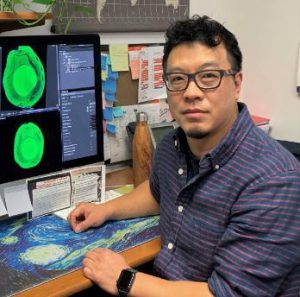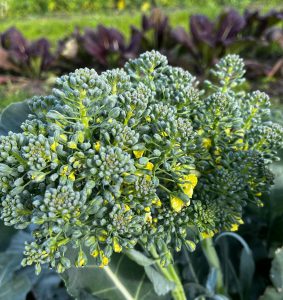Gainesville, Florida, USA
September 8, 2023
When you’re perusing the produce section, you’re looking for fresh fruits and vegetables. If not eaten within a few days after harvest, many age quickly and get thrown out, leading to food waste, say University of Florida experts.
Fruits and vegetables age differently after they’ve been harvested, so Tie Liu wants to know how crops age in that time after they leave the farm and before they arrive at the market.
Liu, a UF/IFAS assistant professor of horticultural sciences, led a team of researchers that published recent research putting them closer to ensuring your fruits and vegetables arrive as fresh as possible at the grocery store. In this study, Liu studied broccoli.

Tie Liu, UF/IFAS assistant professor of horticultural sciences. Courtesy, UF/IFAS.
While broccoli heads are still on the plant, they develop into flower bunches, but once they’re harvested, they wither, turn yellow and die, said Jeff Brecht, a UF/IFAS professor of horticultural sciences and a study co-author.
To solve the puzzle of why produce ages differently when it’s harvested than when it’s left on the plant, UF/IFAS scientists use genomics and genome editing.
For the study, the scientists compared the genes that are expressed during aging of broccoli heads on the plant to the genes that are expressed in harvested broccoli.
Scientists took broccoli from the UF/IFAS horticultural sciences teaching garden and used RNA-sequencing technology to identify genes associated with broccoli tissue aging. RNA is a messenger that produces the important parts of instructions for cell and tissue growth. RNA-sequencing technology lets researchers read these messengers and understand what the plant is doing, Liu said.
Using the genes they identified, scientists found that harvesting turns on some genes that are stress-related, including some that are related to ethylene – the plant ripening hormone. They identified other genes in the postharvest processes that are related to the loss of water and nutrients from the plant.

UF/IFAS researchers led a study in which they examined how to keep broccoli fresh after it’s harvested. Courtesy, UF/IFAS.
“With these results, we feel we’ve identified targets for reducing the negative effects of harvesting on broccoli,” Liu said. “The results should apply immediately to numerous broccoli relatives like Brussels sprouts, cabbage, cauliflower, collards, kale and bok choy. It’s likely that they will also apply to many other fruits and vegetables as well, hopefully resulting in produce that remains fresher and more appealing, as well as healthier, once it gets to consumers’ homes.”
In addition to Liu and Brecht; Utsab Ghimire, one of Liu’s master’s students; Fahong Yu, a data scientist at the UF Interdisciplinary Center for Biotechnology Research bioinformatics core; and Eleni Pliakoni, professor of postharvest handling at Kansas State University helped with the research.
ABOUT UF/IFAS
The mission of the University of Florida Institute of Food and Agricultural Sciences (UF/IFAS) is to develop knowledge relevant to agricultural, human and natural resources and to make that knowledge available to sustain and enhance the quality of human life. With more than a dozen research facilities, 67 county Extension offices, and award-winning students and faculty in the UF College of Agricultural and Life Sciences, UF/IFAS brings science-based solutions to the state’s agricultural and natural resources industries, and all Florida residents.